May 7, 2024 | 23:52 GMT +7
May 7, 2024 | 23:52 GMT +7
Hotline: 0913.378.918
May 7, 2024 | 23:52 GMT +7
Hotline: 0913.378.918
Mr. Nguyen Binh Dong (Bao Lam district, Lam Dong) was able to observe several large economic models, such as hundreds of hectares of fruit plantations in the Southern region and Mekong Delta, among others, during the days and months he spent traveling like a colony of bees searching for honey. Each time he traveled, his desire to establish an agricultural farm in Lam Dong expanded.
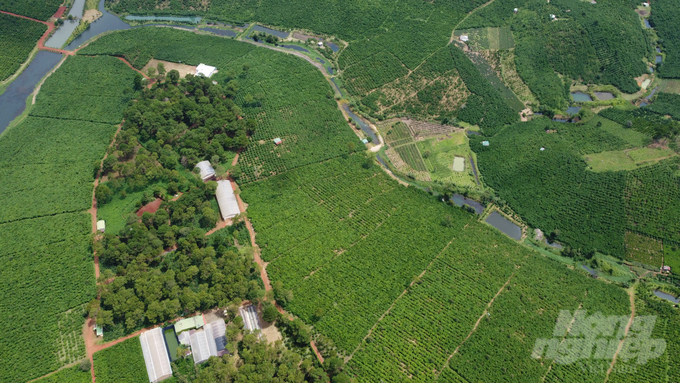
The 111ha coffee farm of Mr. Nguyen Binh Dong's family in Loc Ngai commune, Bao Lam district, Lam Dong. Photo: Minh Hau.
In 1986, he returned to Lam Dong and began construction on an Oolong tea model in Hamlet 8 (the Loc Ngai commune). The man with wrinkled skin revealed, "When I first arrived in this land, I labored alone on a large hill. The area was deserted at the time. I labored and lived in seclusion from the rest of the world and was regarded as "crazy."
According to Mr. Dong, by the 1990s, he had invested in and expanded his olong tea cultivation area by dozens of hectares. By 2008, the olong tea area had grown to 60 hectares, and his tea products were exported. Several units in the province purchased his tea products.
Happiness for tea cultivation was short-lived, as he soon experienced bitterness when his tea products for export failed to reach the point of no return. Facing obstacles, he decided to switch to coffee cultivation and converted the entire olong tea cultivation area to Robusta cultivation.
Mr. Dong stated, "The transformation was difficult without investment capital, mechanization, and machines, among others; we had to do everything manually, including digging the soil, hoeing the ground, and planting each coffee root." In this manner, the price of green coffee ranged from VND 30,000 to VND 40,000 per kilogram; after deducting his expenses, he was able to earn a profit.
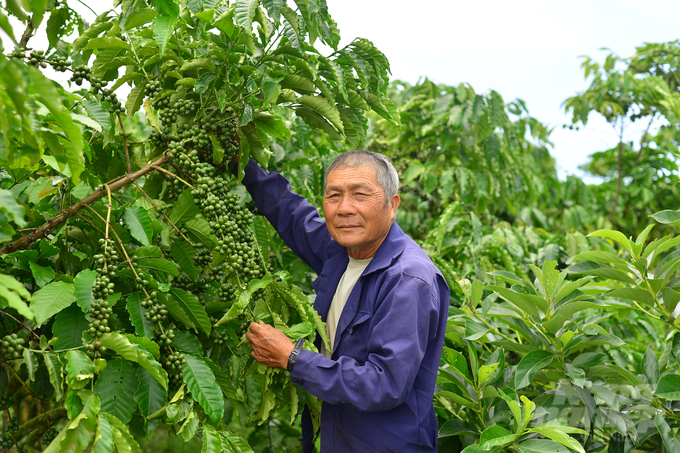
Mr. Nguyen Binh Dong's family started converting from growing Olong tea to coffee in 2011. Photo: Minh Hau.
The price of green coffee is low, the profit is small, and with the growing economic trend, the demand for higher quality coffee is greater than ever before. This has prompted Mr. Dong's family to change their way of thinking and shift their focus from traditional coffee to high quality coffee in order to keep up with market trends. Because each method of cultivating coffee plants results in distinctive coffee profiles, the cultivation phase has a significant impact on the quality of coffee beans.
Mr. Dong revealed that seven years ago, the price of green coffee fluctuated, and the family barely turned a profit. In order to generate income, the family had to cultivate mulberries to raise silkworms on vacant land, adopt short to raise long, and maintain the coffee garden. Initially, the mulberry growing area was limited, so the family raised 3 to 5 boxes of seeds per month, earning approximately VND 70 million. Later, the mulberry growing area was expanded, which substantially increased income.
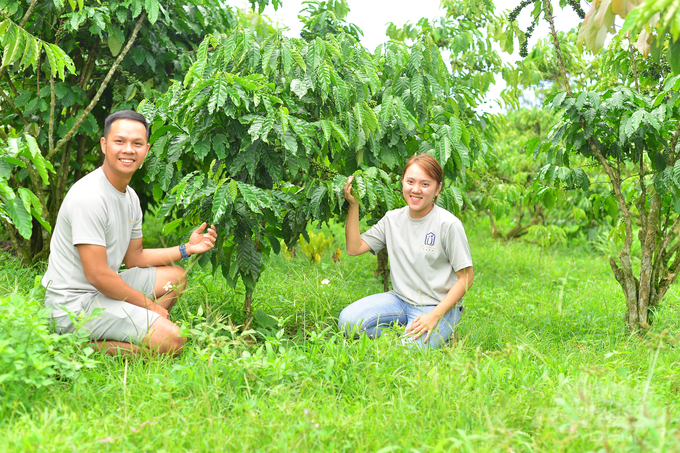
The transition from traditional production to high-quality coffee production was carried out by Mr. Nguyen Binh Dong's family in the form of organic and environmentally friendly production. Photo: Minh Hau.
The income from mulberry aided his family in relieving economic strain and affiliating with the coffee plant. Mr. Dong decided, however, to transition from conventional coffee to high-quality coffee plantation in order to increase coffee's value and transform it into a product with a higher market value.
The transition is accomplished through organic, environmentally responsible production. Mr. Dong's family plants all of the trees in the garden with organic and self-composted fertilizers, as well as without the use of poisonous pesticides.
Mr. Nguyen Thanh Loc, CEO of Binh Dong Farm, stated, "The source of organic fertilizer is generated on the farm by combining manure and microorganisms with coffee pods. The administration of organic fertilizers generates humus in the soil, thereby enhancing plant nutrient absorption. Therefore, trees in the garden have superior growth and produce quality.
Not only is the purity of raw coffee enhanced, but so is the method of coffee processing. His family first visited high-quality coffee models on the market to gain additional knowledge, then began producing the first modest quantities of high-quality coffee. Due to a paucity of facilities, the preliminary processing is performed manually, the coffee is washed by hand, and instead of drying on drying racks, the silkworm rearing platforms are used.
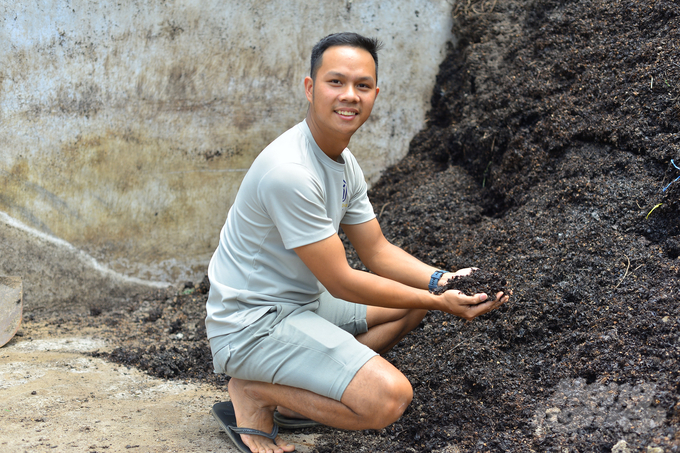
All trees in the garden are used by Mr. Nguyen Binh Dong's family with organic fertilizers and self-composting to fertilize, especially without using toxic pesticides. Photo: Minh Hau.
According to Ms. Do Ngoc Tram Anh, who is in charge of processing high-quality coffee at Binh Dong Farm, coffee products are annually delivered to specialized coffee establishments in Bao Loc City, Ho Chi Minh City, for quality evaluation. These establishments have been recognized by the World Coffee Association as prestigious. Ms. Do Ngoc Tram Anh remarked that the results of the first year of producing high-quality coffee for the family also astonished her, as the Robusta coffee attained an unexpected flavor and was rated quite highly for its quality.
From the initial successes, Mr. Nguyen Binh Dong's family continued to invest in the upgrading of the processing process, the expansion of the raw material area to 111ha, and the construction of factories, preliminary processing and processing areas to enhance coffee quality and value.
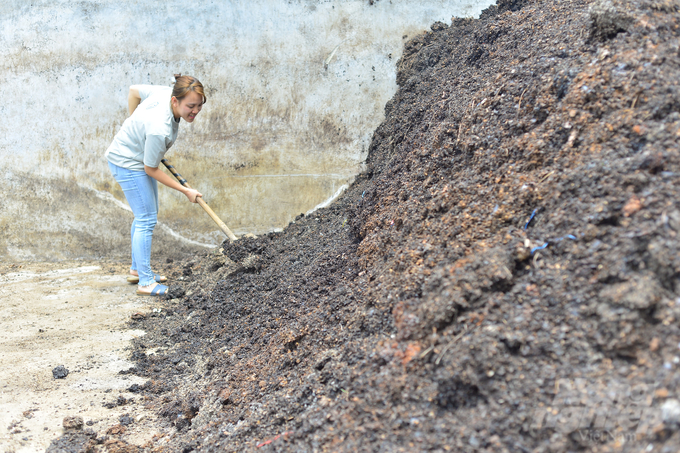
The source of organic fertilizer is produced at Binh Dong Farm by taking advantage of coffee pods to combine manure and probiotics. Photo: Minh Hau.
Currently, with the processing process and production scale of high-quality coffee being upgraded, the output of high-quality coffee exceeds 300 tons per year and is steadily increasing, with 70% of production consumed domestically and the remainder exported to European and Southeast Asian countries.
The advantage of being proactive in raw materials, combined with an organic coffee area of up to 111 hectares, has enabled Binh Dong Farm to control all stages of the closed production process, from input materials to preliminary processing and processing, and thus produce high-quality coffee beans for domestic and export markets. In addition, it reduces the population's dependence on coffee production and is not passive to market prices.
Translated by Linh Linh
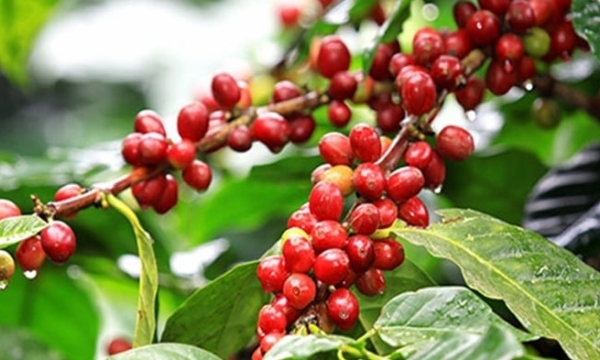
(VAN) In 2024, Vietnam exported 756,000 tons of coffee, worth $ 2.57 billion, up 5.4% in volume and 57.9% in value over the same period last year.
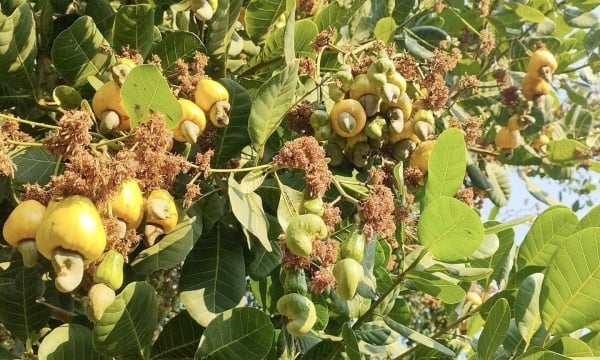
(VAN) With China's increasing demand, Vietnam boosts exports and wants to bring cashew nuts deeper into this market.
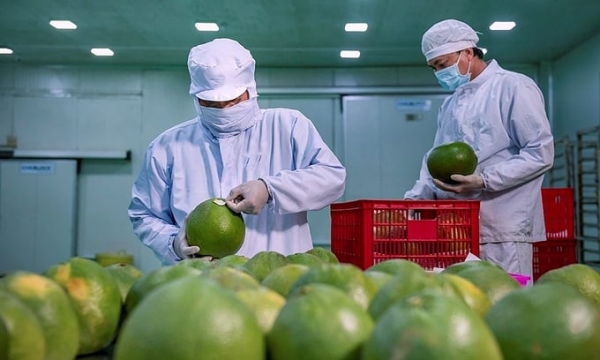
(VAN) Australia is set to import fresh pomelos, under the condition that Vietnam meets biosecurity standards and implement appropriate risk mitigation measures.
/2024/05/04/2957-3-182641_611.jpg)
(VAN) More than 500 international buyers registered for trade connections, finding sources of agricultural products, food, wooden furniture, etc. at the Vietnamese Typical Goods Fair 2024.
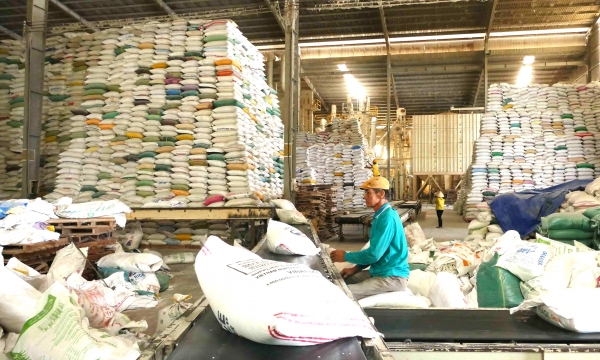
(VAN) Enterprises and localities need further information on market orientation, analysis, market demands, and pricing in order to effectively plan their rice export strategy in the near future.
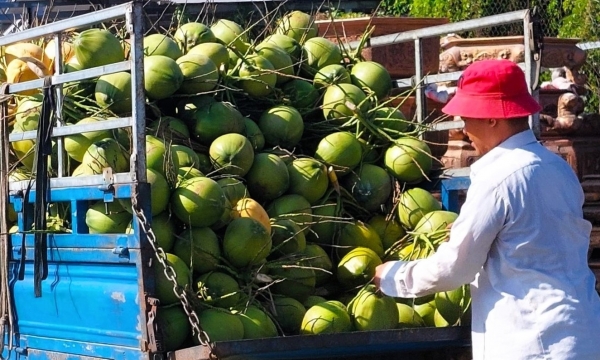
(VAN) Ben Tre strives to reach 20,000 hectares of organic coconut in the whole province by 2025 and promotes fresh coconut exports to the US market.
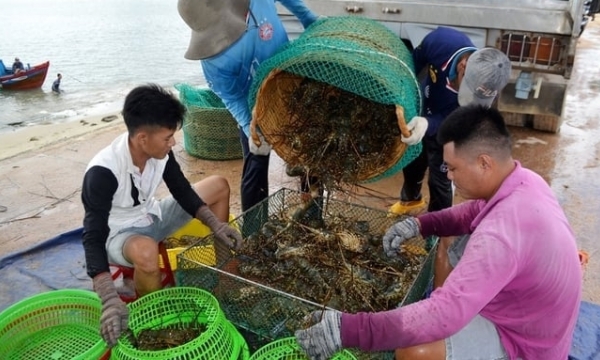
(VAN) Enterprises, cooperatives, and shrimp farmers in Phu Yen are supported and guided towards exporting lobsters through official channels to China.